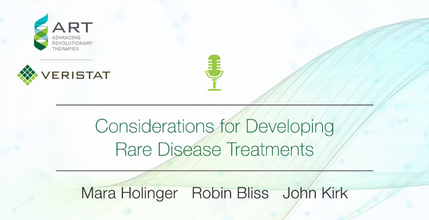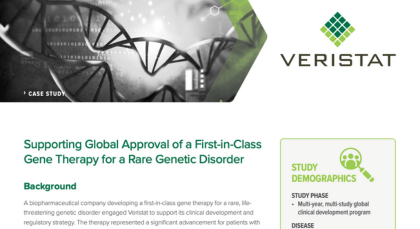Solutions
35% of the Work We Do Supports Rare and Ultra-Rare Diseases
Accelerate your rare disease drug or biologic through the development and approval process.
We understand that nothing is standard when developing a therapy for a rare or ultra-rare disease. From regulatory pathway selection to patient recruitment challenges to navigating the volume of data to collect and clean, a rare disease trial requires extraordinary coordination.
Veristat’s scientific-minded experts excel at supporting the development of therapies to treat rare and ultra-rare diseases, accounting for 35% of the work we do. In the past five years, our team members have supported more than 350 clinical trials and consulting projects for rare diseases. Additionally, we celebrated the 30 regulatory approvals in the past 5 years for rare disease therapies where we supported the marketing application preparation.
+0
Clinical Trials & Consulting projects in the past 5 years
+0
For Rare Endocrine/Metabolic Diseases
+0
For Rare Cancers
Let's Talk.
Contact Veristat Today!
We know there are always unknown challenges when bringing a novel therapeutics to market, so we’ve assembled an extraordinary team of scientific minded experts who have mastered the complexities of therapeutic development enabling sponsors to succeed in extending and saving lives.
Clinical Trial and Regulatory Consulting Expertise for Complex and Rare Diseases
-
Rapidly advance your clinical trial to its next milestone.
-
Reliably achieve regulatory success with regulatory consulting advice, marketing application support, and regulatory publishing.
-
Gain trusted strategic advice from scientific experts across all disciplines along the clinical development and commercialization pathway.
-
Ensure ongoing safety for marked products with Post-Market Pharmacovigilance.
Your Global Partner in Rare Disease Therapy Development
Podcast: Clinical Development and Regulatory Considerations for Developing Rare Disease Treatments
In this episode of Advancing Revolutionary Therapies, Veristat Regulatory experts discuss the challenges of developing rare disease treatments and key considerations for planning studies for rare diseases in the U.S. and globally. Check out the full episode to learn more.

Strategies for Success in Rare Disease Clinical Trials
Given the challenges of finding, recruiting, and retaining patients for rare disease trials, there are countless considerations to improve clinical program success:
-
Consider using a central site model to ease patient participation and travel burden.
-
Add a virtual site or an at-home visit model to reach a broader patient pool and accelerate your study enrollment timelines.
-
Select the right regulatory strategies, study design, and expedited pathway(s)
-
Understand the specific disease progression through a natural history study to determine how that might affect study design, data capture, and safety reporting
Fortunately, patients with rare diseases and their families are among the most involved and proactive patient populations in the world. They actively participate in trial design, help recruit other patients, and contribute to building registries. Above all, patients’ primary goal is to advocate for effective therapies for rare diseases, urging sponsors to expand their research on an international scale. Veristat sees great promise in this collaborative and encouraging approach.
Scientific Excellence Across Rare Disease Therapy Development
Rare Autoimmune
ADA-SCID
Familial Mediterranean Fever
Graft vs. Host Disease (GVHD)
Hereditary Angiodema (HAE)
Primary Biliary Cholangitis
And More...

Rare Endo/Metabolic
Achondroplasia
Adrenoleukodystrophy
Gaucher Disease
Lysosomal Storage Disorders
Sanfilippo Syndrome
And more…

Rare Hematology
Beta-Thalassemia
Hemophilia B
Sickle Cell Anemia
Thalassemia
Thrombocytopenia
And more…

Rare Neurology
Canavan Disease
Menkes Disease
Huntington's Disease
Tardive Dyskinesia
Tourette's Syndrome
And more…

Rare Oncology
Adrenoid Cystic Carcinoma
Cholangiocarcinoma
Glioma
Ovarian Cancer
Thyroid
And more…

Rare Opthamology
Achromatopsia
Choroidal Neovascularization
Leber's Congenital Amaurosis
Retinal Degeneration
Retinitis Pigmentosa
And more…

I am grateful for the dedication, excitement, and clinical trial expertise that the Veristat team has given Alnylam since the start of this program. Veristat accepted our challenge and their collaboration has been critical to the successful clinical trials that led to the U.S. FDA approval of ONPATTRO.










